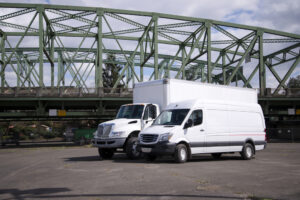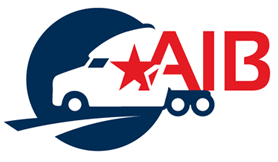What are box truck insurance coverages?
When shopping for box truck insurance, you can customize your coverages. Box truck insurance coverages are the specific protections you would like to have on your commercial vehicle. They each cover a specific risk and liability associated with operating a box truck.
All the coverages below aim to provide you with financial security. If you have questions about which coverages you need, the team at American Insurance Brokers can help. The coverages you need will depend on your cargo type, business risk profile, and regulatory requirements.
Liability Coverage
Liability coverage is your foundation. It helps protect your business in the event of bodily harm or property damage. If you’re held responsible, it can lower your financial responsibility.
This coverage usually covers two types of liability.
Bodily Injury Liability
If an accident involving your box truck injures someone, this coverage will protect you. It covers medical expenses, legal fees, and other related costs.
Property Damage Liability
If your box truck damages another person’s property, there may be significant costs for repairs. Property damage liability will help cover repairs and replacement for said property.
Physical Damage Coverage
Your box truck may sustain damage in an accident. When this happens, you need physical damage coverage. This coverage is designed to cover repairs and replacements of your damaged box truck.
Physical damage coverage protects you and your box truck after accidents, collisions, vandalism, theft, fire, and other covered events. It contains two parts.
Collision Coverage
This coverage pays for any repair or replacement if your box truck collides with another vehicle or object.
Comprehensive Coverage
There is a risk of your box truck being damaged in other events than a collision. Comprehensive coverage safeguards you and your box truck against damage caused by theft, vandalism, fire, and natural disasters. It also provides coverage for your box truck if it sustains damage from hitting an animal.
Cargo Insurance
The cargo you carry is valuable. You do not want to be responsible for any damage, theft, or loss of the cargo during transportation. Cargo insurance will cover the value of your cargo if something happens to it in transit. If you haul valuable or perishable items, this coverage is essential.
Uninsured/Underinsured Motorist Coverage
Unfortunately, there are drivers who are either uninsured or underinsured. If your truck crashes with theirs, their insurance might not cover your damages. This coverage will help cover medical expenses and damages for you and your passengers.
Medical Payments Coverage
If you were injured in an accident, medical payments coverage will help you. This type of coverage pays for medical expenses for you and your passengers. It will kick in no matter who is at fault for the accident. It will cover your medical bills and related costs for injuries resulting from the accident.
Non-Owned Trailer Coverage
Let’s say you rent your box trucks from another company. This coverage will provide protection for the use of those non-owned trucks.
General Liability Insurance
General liability insurance is not exclusive to box trucks, but it does help businesses that operate them. It covers a range of business-related liabilities. These include property damage at the delivery site, slips and falls, and other accidents that may occur.






